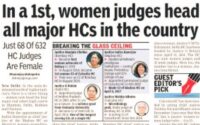THE EVER-LOOMING DARKNESS OF LAW OF SEDITION
This article is written by “Meghna Jalali” from “Ansal University” and curated by Anjeeta Rani of Chanakya National Law University.
A sincere omission used to be ratified, albeit, realized after a decade. With the enactment of the Indian Penal Code Amendment Act, 1870, the regulation of sedition took delivery and in came, the darkest days for the most cherished right- the proper to express. The dystopian society, with the form benefits of the ‘government’ in energy, returned then, was once confused with a draconian law, which unluckily nonetheless finds a vicinity in our society, with no assessments and balances, leaving countless humans destitute. The uproar of our countrymen towards the barbaric atrocities dedicated in opposition to them compelled the authorities in power to implement the regulation of sedition, which had observed its haven in Section 113 of Macaulay’s Draft Penal Code of 1837-39. The enforcement of the enactment of the law, introduced deleterious effects, which until date, tends to relax down the spines of the alleged violator. The Section, as used to be added in 1870, used to be titled ‘Exciting Disaffection’. An act, which perpetrates a feeling of disaffection in the direction of the Government, through phrases or signs and symptoms or seen illustration or otherwise, used to be punishable beneath Section 124(A) of the Indian Penal Code, 1860. An exception to the offence was once carved out in the explanation, wherein, the disapprobation of the measures of the authorities which have been in tune with the dogma set out using the authorities used to be now not introduced into the clutches of the offence.
Lately, there are numerous eminent personalities such as Mr. Vinod Dua, Mrs. Sudha Bharadwaj, Mr. Varavara Rao and Mr. Gautam Navlakha, who have been booked beneath the old-fashioned law, which law, in my opinion, requires the immediate interest of the Government to defend free speech, which is granted by using our Constitution.
The first case of sedition in British India, colloquially recognized as the ‘Bangobasi’ case, was once tried by using a Jury. C.J. Sir Comer Petheram, expounded the regulation to the Jury, as, any man or woman the usage of any word, spoken or written, to his target audience to insinuate the thought of now not obeying the lawful authority or subverting or resisting the authority, would be responsible for the offence, even though, no overt act in pursuance of such non-obeying the lawful authority has been committed.
The exceptional and celebrated case of ‘Queen-Empress v. Bal Gangadhar Tilak’ got here earlier than the Bombay High Court. Mr. Tilak was once charged with the offence of developing disaffection in the society closer to the British Rule and its administrators. Justice Strachey defined the law, with a fascinating commentary that a man is guilty if he excites or tries to excite emotions of disaffection; it is immaterial that any emotions of disaffection or enmity closer to the authorities need to have been excited, due to the fact a mere try to excite such a feeling, ensuing, an unsuccessful act would additionally be on the equal footing as a profitable seditious act.
The wheels of the regulation of sedition had grown to become with the Government of India Act, 1935, the Independence Act, 1947 and the Indian Constitution of 1950. After Independence, the harrowing regulation has placed its haven below the head “Of Offences in opposition to the State”.
The law of sedition was once scarcely used by using the police equipment in the first decade of the twenty-first century, in turn, paving the way for the free glide of ideas, which protected dissent in opposition to the authorities and its policies.
The regulation of sedition additionally solidified its eerie shadow upon the maverick lawyer, Late Mr. Arun Jaitley. Mr. Jaitley had penned down his views on the NJAC judgment handed with the aid of the Constitutional Bench of the Supreme Court, which used to be taken with a stern view by way of a Judicial Magistrate of the State of Uttar Pradesh, who had taken suo-moto attention of the article and registered a Complaint towards Mr. Jaitley underneath Section 124A of the Indian Penal Code.
The Court held that the article used to be to voice the opinion of the writer to strike a stability between the two necessary pillars of our united states and therefore, using no stretch of imagination, the contents of the article can be stated to create public disease or designed or aimed in opposition to the Government installed through law.
AMENDMENTS:
In my opinion, the below-listed amendments can be added to the regulation of sedition, to hold a look at the regulation to make sure that the identical is no longer unscrupulously and surreptitiously used in opposition to harmless people.
- Establishment of a Special Court: A Special Court presided with the aid of the District and Sessions Judge must adjudicate the instances of sedition.
- Preliminary Inquiry: In instances of sedition, an officer no longer under the rank of Superintendent of Police of the district shall habit a preliminary inquiry about the Complaint and shall post a Preliminary Report containing the statistics incidental to the Complaint and the declaration of witnesses to the Special Court.
- Timeline: The involved Superintendent of Police, shall put up his record no longer later than ten days from the receipt of the Complaint to the extraordinary court.
- Interim Order: The Special Court shall omit an Interim Order, primarily based on the Report furnished by way of the Superintendent of Police.
- Appeal: An Appeal shall lie in opposition to such Order earlier than the involved High Court. The Appeal shall be filed inside a length of thirty days.
The aforesaid suggestions, if implemented, shall stop the exploitation provided through the regulation of sedition and shall ensure, in letter and spirit, that freedom of speech and expression and propagation of thoughts is the hallmark of democracy.


